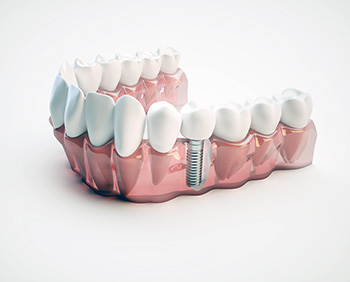
Dental implants are always the best option for replacing missing teeth, for function, aesthetics and longevity. Dental implants can be used in cases with one missing tooth or an entire arch of missing teeth. Advancements in the dental field in the last 20 years have created more and better options for patients who have experienced tooth loss, whether it’s due to trauma/injury, gum disease or cavities. A dental implant comprises a titanium screw inserted into the bone where the missing tooth is left to heal for several months with a temporary crown placed on top. Once the screw is integrated and fused into the bone, a permanent dental crown is placed on top to match the shape, colour and appearance of the surrounding teeth. Listed below are the benefits of dental implants:
Functions Just Like a Natural Tooth
Upon completing all steps involved in the dental implant process (healing and permanent crown placement), the dental implant functions the same as a healthy, natural tooth. You don’t have to take anything out/ put it back in nightly, like a denture. Dental implants can withstand the same biting and chewing forces as natural teeth can. Implants also get cleaned the same as natural teeth, brushing at least twice a day and flossing at least once a day. Your dental hygienist will use a unique plastic tool to clean your implant during your routine cleaning appointments.
Aesthetically Superior
A dental implant is the most aesthetically pleasing option for replacing a missing tooth. Other options are to leave the space, a dental bridge or a partial denture. The dental implant crown matches the exact shape, size and colour of the surrounding teeth for a perfect match.
Lasts a Lifetime
If properly cared for (good oral hygiene and routine dental visits,) dental implants can last a lifetime. During your regular hygiene appointments, the implant and surrounding gum and bone will be checked for health.
Maintains Health of Surrounding Teeth
If space is left from a missing tooth/teeth, oftentimes, the opposing teeth will over-erupt, and the adjacent teeth will drift to fill the space. Before shifting of surrounding teeth occurs, it is essential to address the missing tooth. Bone resorption can also happen in the area of a missing tooth. When an implant is placed, the bone stays at the correct height, and there is no drifting of surrounding teeth.
Can Replace the Need for Dentures
Dental implants may be used to replace a single missing tooth or an entire arch of missing teeth. Several implants can be placed along an arch, and an implant-supported denture can be inserted overtop. This type of implant-denture is fixed, meaning it doesn’t need to be taken out nightly and is exceptionally stable for regular biting, chewing and speaking.
